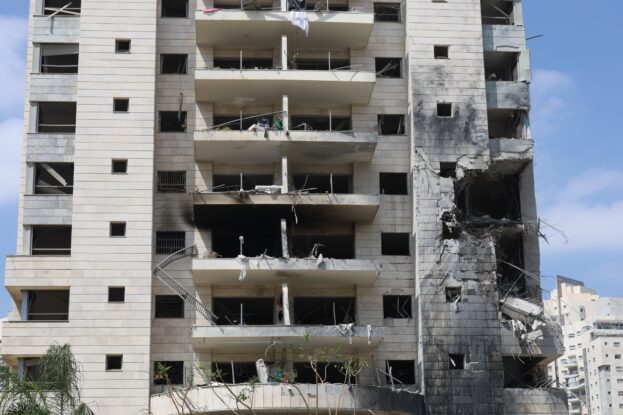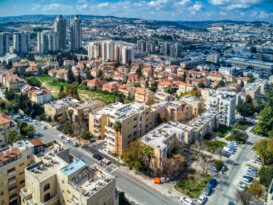The ongoing conflict between Israel and Iran is sending shockwaves through nearly every sector of Israeli life, including housing. From halted construction sites and surging rental demand to shifting trends among local and foreign buyers, the real estate market is under pressure. Amid the devastation—including the loss of life, widespread trauma, and destruction of critical infrastructure—housing has become both a casualty and a lifeline. This article explores how the war with Iran is impacting Israel’s real estate market across eight key areas—and what it could mean for both local and foreign buyers.
Since October 7, 2023, Israel has been fighting on multiple fronts—against Hamas in Gaza, Hezbollah in the north, the Houthis in Yemen, and other Iranian-backed forces in Syria. But with the launch of Operation Rising Lion, the war has now escalated into a direct and unprecedented confrontation with Iran itself.
In just a few days, Israel carried out a series of extraordinary, precision attacks on Iranian nuclear and military infrastructure—sites that Iran had spent decades developing. In retaliation, Iran and its proxies have launched hundreds of ballistic missiles and armed drones toward Israeli cities, military bases, and critical infrastructure. While most have been intercepted, some found their targets, causing immense damage to homes, buildings, roads, and facilities, and leaving thousands of families displaced. This marks one of the most intense military escalations in Israel’s history—not only in terms of firepower and range, but also in the level of threat to civilians in nearly every part of the country.
While global attention is focused on defense operations, diplomacy, and humanitarian aid, the ripple effects of the Iran war are also being felt in Israel’s local real estate market. From halted construction and rental market shortages to shifting priorities among both Israeli families and foreign buyers, the housing landscape is under extraordinary pressure.
Here are 8 major ways the Iran war is already impacting Israel’s real estate market, according to insights gathered by Buyitinisrael:
1. Construction Sites Go Silent
Since the launch of Operation Rising Lion, nearly all construction activity across the country has come to a standstill. Under current Home Front Command regulations, only “essential activity” is permitted in most areas. The construction sector—which was deemed essential during COVID—is now classified as non-essential, unless the site has on-site bomb shelters or has received explicit approval from authorities.
This means that excavation, crane operation, and all open-site activity are prohibited. As of mid-June, only about 5% of construction projects—mostly those nearing completion and with in-place protected spaces—have been allowed to operate.
Beyond the safety debate, the consequences of the shutdown are significant. Project timelines are being extended, delivery dates pushed off, and equipment is sitting idle.
As calls grow louder to safely reopen the sector, there is a broader takeaway too: the war has made it crystal clear that bomb shelters and reinforced safe rooms aren’t optional—they are lifesaving. Developers, regulators, and residents alike are being forced to reckon with the urgency of protection in every stage of planning and construction.
2. Foreign Worker Exodus
Even before this latest conflict, Israel’s construction industry was under strain. After October 7, the country lost access to tens of thousands of Palestinian workers who had previously formed the backbone of on-site labor. To fill the gap, Israel has brought in foreign workers from countries such as India, Sri Lanka, and Moldova.
Now, many of those workers are asking to return home. Living in high-risk zones, with limited freedom of movement and shuttered worksites, they are anxious and idle. Others may hesitate to come at all, fearing for their safety in a country under fire.
This worsening labor shortage is a ticking time bomb for the industry. Without hands on deck, even when construction resumes, the pace of building will be significantly slower. Expect longer delays, rising costs, and greater difficulty completing projects on schedule.
3. New Housing Starts Decline While Inventory Surges
While construction has ground to a halt due to the Iran war, the real estate slowdown didn’t begin with Operation Rising Lion. Even before the escalation with Iran, the housing sector was showing signs of strain. In the first half of 2025, building permits and project launches dropped significantly as developers grew cautious in the face of weak demand, rising costs, and prolonged uncertainty following the war that began on October 7, 2023. And now, housing starts are expected to fall even further due to halted construction sites, worker shortages, and regulatory slowdowns.
But interestingly, the dominant story in recent months has been the oversupply of unsold new apartments. According to the Central Bureau of Statistics, by the end of April 2025, there were approximately 79,410 new apartments available for sale—a 20.5% increase compared to the same time last year.
So while supply is high now, the war with Iran means we’re no longer replenishing that supply for the future. If construction continues to stall, we may eventually reach a point of rebalancing—or even shortage—especially in high-demand areas.
In short: the current market is a rare moment of oversupply, but that window may not stay open for long.
4. Sales Activity Freezes—But Need Remains
With close to 450,000 Israeli reservists called up and millions of citizens living under threat of rocket fire, real estate transactions have dropped sharply. Buyers are distracted, sales offices are closed, and mortgage banks and attorneys are operating at reduced capacity.
However, this slowdown is not a reflection of diminished need. On the contrary—demand for housing is rising, as thousands of residents are displaced and homes in active or high-risk zones are rendered uninhabitable.
There is also a growing emotional urgency. Many families—especially those with young children or the elderly—are actively planning moves to safer neighborhoods or homes with better protection. In some cities, local authorities have begun receiving requests to expedite building permits for home fortifications and to support emergency relocation efforts.
Once the immediate fighting subsides, we expect a resurgence in sales activity, as both local and foreign buyers act on long-delayed decisions.
5. Rental Market Squeezed by Safety Concerns
Summer is traditionally the busiest season for rentals in Israel. Families relocate before the school year, students search for apartments, and many leases reset in June and July. But this year, the regular churn has collided with crisis.
Thousands of families across the country have had their homes damaged or destroyed by direct hits, shrapnel, or nearby blasts. Even more are choosing to leave apartments that lack proper protection, especially those built before the 1990s, which often lack a mamad (reinforced safe room) or any secure shelter space. For many renters, safety has become more important than square footage or even location.
The result is a massive surge in demand for rental properties that offer a mamad. Across the country, competition is fierce. Prices are rising, supply is vanishing, and landlords are fielding multiple offers within hours of listing.
6. Foreign Buyers Shut Out—But Poised to Return
As of mid-June, Israel’s skies remain closed, and the uncertainty has frozen travel plans for thousands of Diaspora Jews. Families who had planned trips have been forced to put everything on hold. But the interest hasn’t disappeared—it’s growing.
Since October 7, there has been a notable increase in overseas buyers viewing Israel as a safe haven. People who never previously considered purchasing a home here are now looking for footholds—ways to plant roots in the Jewish homeland, protect their families, and their money.
Buying a home in Israel has become not just a luxury, but a backup plan. And as the war continues, we’re seeing that intention deepen. More and more Jews around the world are thinking seriously about buying, many for the first time ever. Real estate, once considered a dream for retirement or vacation, is now being viewed as a form of security, continuity, and identity.
7. Strong Dollar—But the Shekel Is Rebounding
After the outbreak of Operation Rising Lion, the Israeli shekel weakened sharply, hitting around NIS 3.61 per USD, giving foreign buyers a rare window of opportunity with stronger purchasing power.
But that window may already be closing. Over the following days, the shekel rebounded, strengthening to about NIS 3.50 per USD—its strongest level since late 2023. That means U.S. buyers now get fewer shekels per dollar, making Israeli homes more expensive in dollar terms than they were just days ago.
But while the shekel’s recovery may dampen the currency advantage, it also signals confidence in Israel’s economy, which should reassure long-term investors.
8. What’s Next? A Window of Opportunity
In the short term, the Iran war is softening the real estate market in Israel. Sales volumes are down, inventory is up, and many developers are sitting on unsold units. To keep projects moving and maintain stable cash flow, we expect to see more incentives, discounts, and flexible payment terms—especially in areas with high volumes of new construction and limited safety features.
Meanwhile, construction has slowed dramatically. Across the country, projects are frozen. From Tel Aviv to Beit Shemesh, from Ashkelon to Haifa, hundreds of thousands of square meters are sitting in limbo. Labor shortages, material delays, skyrocketing insurance costs, and war-related uncertainty are choking the future supply of housing.
At the same time, thousands of families whose homes were destroyed or severely damaged will be urgently seeking alternative housing. And it’s not just those directly affected—many others living in older buildings without safe rooms are actively trying to relocate to more secure homes. The result is a market under intense strain.
Over time, this combination of reduced supply, rising construction costs, and increased demand—both for rentals and for purchases—will likely place upward pressure on prices, especially in strong, supply-constrained markets.
At Buyitinisrael, we believe the next phase of the market presents a rare and delicate mix of uncertainty and opportunity. Prices in some areas may ease. Developers may be more open to negotiation. And for those who have been waiting for the right moment to buy, even from afar, this could be it. While for displaced families, it’s not about timing—it’s about survival, stability, and rebuilding. And for renters, it’s becoming a race for safety and availability.
A Tipping Point is Coming
Much like the wave that followed COVID-19, following the Iran war, we anticipate a surge in real estate activity from the Diaspora the moment the borders reopen. Buying a home in Israel has become more than aspirational—it has become existential. The signs are there: we’re about to see it again.
Our advice: Stay informed. Stay engaged. And when you’re ready, we’re here to help you Buyitinisrael.

Debbie Goldfischer is the founder and CEO of Buyitinisrael and the host of the Israel Real Estate Podcast: On The House. A prominent figure in real estate since 2004, Debbie has spent two decades helping foreign buyers successfully purchase homes in Israel. Seeing a lack of reliable, English-language resources for navigating the Israeli property market, she launched Buyitinisrael.com in 2020. In addition to leading the platform, Debbie is available to personally assist you in finding the right property—whether new or resale—anywhere in Israel.
To connect with Debbie, email debbie@buyitinisrael.com.







